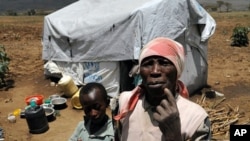Part 1 of 5-part series: Kenya: The Pace of Reforms
See Parts 1 / 2 / 3 / 4 / 5
February 28 marks the three-year anniversary of the peace agreement which ended Kenya's post-election chaos. But many are still waiting for help and a chance to begin their new lives.
Three-year annivesary of peace agreement
From late December, 2007 through February of 2008, the world watched as a country once praised for its stability proceeded to tear itself apart.
A dispute between rivals President Mwai Kibaki and current Prime Minister Raila Odinga quickly engulfed the entire nation, opening ethnic fissures which left over 1,300 dead. For weeks, many Kenyans did not leave their homes. National highways were patrolled by armed militias and airplanes bound for the popular tourist destination arrived empty.
The crisis raged for nearly two months, until former United Nations Secretary General Kofi Annan was able to unite the two opponents in a government of national unity.
“Compromise was necessary for the survival of this country. Support this agreement, for it is the key to the unity of Kenya. It is a foundation for national reconciliation and it is a springboard to economic recovery,” Annan said.
Many still displaced and impoverished
More than three years have passed since Kenya’s infamous 2007 presidential elections and the country bears very few physical scars from that period. Kenya’s tourism sector has largely recovered, as has its region-leading economy.
But scattered along Kenya’s new and improved highways are the occasional tent settlements of those Kenyans whose lives were irreversibly affected by the chaos. Years have passed, but many of Kenya’s internally displaced remain without homes.
Kenya’s Ministry of Special Programs estimated that over 350,000 Kenyans sought shelter in one of nearly 120 camps across the country after the violence in 2008. In May of that year, the Government of Kenya launched Operation Rudi Nyumbani - or return home - in an attempt to meet provisions outlined in the February peace deal. In addition to resettlement, the government pledged about $400 to assist those forced from their homes.
But Operation Rudi Nyambani has been roundly criticized by groups such as the Kenya Human Rights Commission, which described the exercise as forced resettlement. During the first phase of the operation, the government simply shut down the majority of its camps. But many residents felt they could not return, due either to ethnic tension or the destruction of their homes. New settlements, dubbed “transit camps” sprang up in response.
Along one of Kenya’s highways, just under an hour from Nairobi in Maai Mahiu sits one such camp - Vumilia Eldoret camp - which houses displaced Kenyans from the volatile Rift Valley. Vumilia means “patience” in Swahili and the camp’s residents say they are waiting for the government to keeps its promises.
Jane Wanyoike serves as the treasurer of the Vumilia Eldoret Camp. Jane told VOA many of Vumilia’s residents have not received their full payments of $400. Many families still live in tents provided by the UN refugee agency UNHCR. But the tents were meant to last for six months and all have gaping holes in desperate need of repair. One resident told VOA the only food ever supplied by the government was corn.
For now, tent city - a way of life
Vumilia Camp is now three-years-old, and the residents have long given up hope of government assistance. Pooling their resources in 2008, residents of the camp decided to buy the land they had been living on and build a permanent settlement. The residents farm together on small plots growing food to feed their families. Over the past two years, Habitat for Humanity has been helping the residents of Vumilia build houses for the 225 families living there to settle permanently. More than 100 houses have already been built but more than half are still living in tents.
And Vumilia is not the only camp which still exists in Kenya. A report commissioned by the African Union’s Panel of Eminent African Personalities - which helped broker the 2008 peace - found that as many as 19,000 had yet to be permanently settled by the Kenyan government. The report also found that 62 percent of Kenya’s internally displaced people had not received the funds promised by the government to help them return home and repair their damaged properties.
Tensions are rising across the country as ethnic groups begin to view Kenya’s displaced as foreigners invading local communities. In the Taita-Taveta district of Kenya’s Coast Province, community leaders have rejected a government plan to build a permanent settlement for some 10,000 internally displaced people. Groups such as the Kenya Land Alliance instead demanded the government return communities to their original homes.
But for Jane Wanyoike, there is simply no point in returning to her home in Eldoret. Jane told VOA that after three years in Maai Mahiu, the community had built a new life for itself and wouldn’t benefit from being uprooted once again.
The community is now looking toward the future. Wanyoike says the Vumilia group hopes to buy more land around the settlement in order to produce more crops and perhaps create jobs for their residents.







